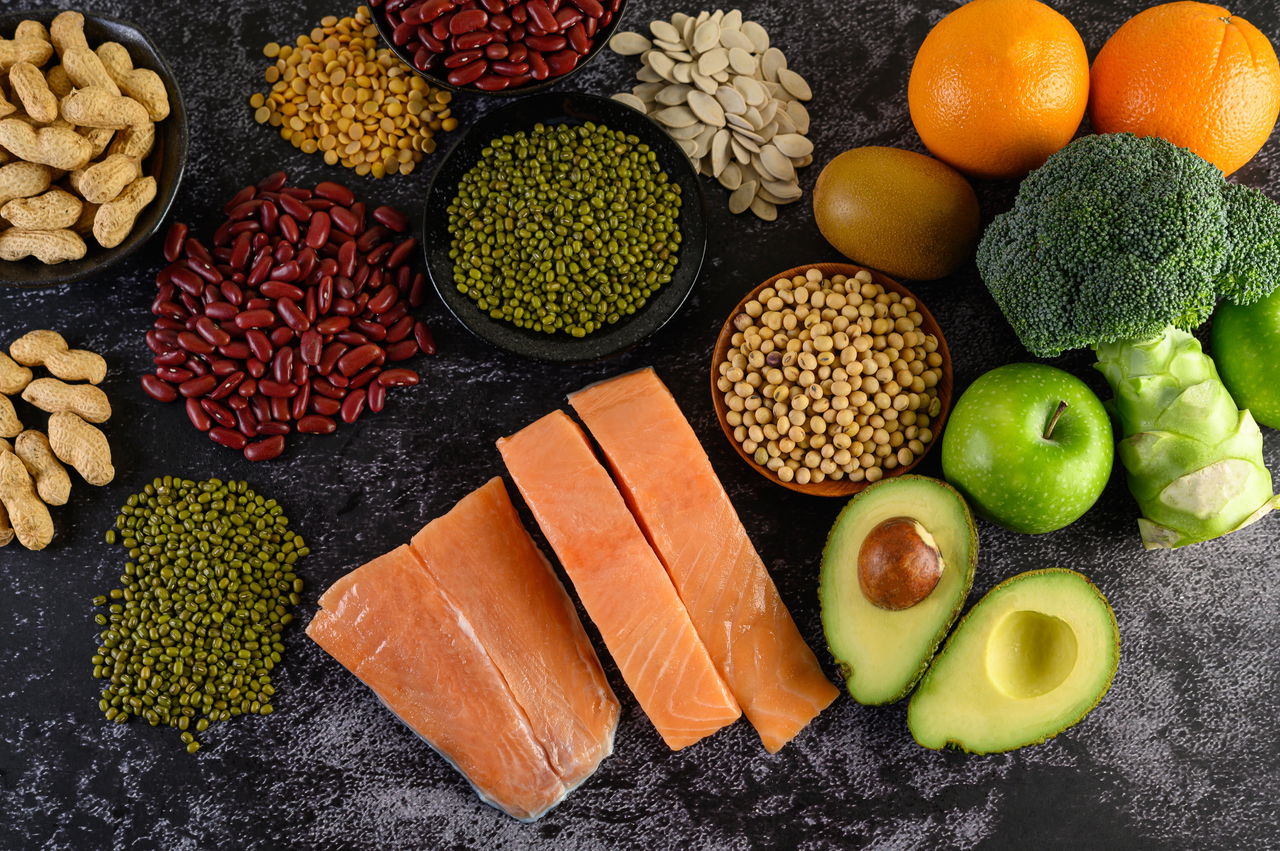Hibrid guide
Plant-Based Protein vs. Animal Protein: Which Is Better for You?
8 min. read


Written by
Alicia Madison
Published
Fri, 25 Oct 2024
Introduction
Protein is essential for building and repairing tissues, supporting immune function, and maintaining muscle mass. However, there’s ongoing debate about whether plant-based or animal-based protein is better for health, muscle gain, and longevity. Both sources offer unique benefits, so understanding their differences can help you make informed choices that align with your dietary preferences and health goals. In this article, we’ll explore the benefits, drawbacks, and key differences between plant-based and animal proteins to help you decide which is best for you.
Understanding the Basics of Protein
Proteins are made up of amino acids, often referred to as the building blocks of life. There are 20 different amino acids, nine of which are “essential,” meaning the body cannot produce them, so they must be obtained through diet.
-
Complete Proteins : These contain all nine essential amino acids. Animal proteins (such as meat, fish, eggs, and dairy) are generally complete proteins, providing all essential amino acids in adequate amounts.
-
Incomplete Proteins : Most plant proteins (like beans, grains, and nuts) are considered incomplete, as they lack one or more essential amino acids. However, by combining different plant-based protein sources, you can still achieve a complete amino acid profile.
Benefits of Plant-Based Protein
1. H igh in Fiber and Nutrients
Plant-based proteins, like beans, lentils, and quinoa, are not only good sources of protein but are also rich in fiber, vitamins, minerals, and antioxidants. Fiber supports digestive health, helps control blood sugar, and reduces cholesterol, making plant-based diets heart-friendly.
2. Lower in Saturated Fat
Plant-based proteins tend to have lower levels of saturated fat compared to animal proteins. High saturated fat intake is associated with increased cholesterol and cardiovascular disease risk. By focusing on plant-based proteins, you can support heart health while still meeting your protein needs.
3. Anti-Inflammatory and Antioxidant Properties
Many plant proteins contain antioxidants and phytochemicals that reduce inflammation and oxidative stress, which can protect against chronic diseases. For instance, legumes and nuts are packed with compounds that support immune function and reduce the risk of age-related conditions.
4. Environmental Sustainability
Plant-based proteins generally have a lower environmental footprint, requiring fewer resources like water and land, and producing less greenhouse gas emissions. For those concerned about sustainability, opting for more plant-based proteins can be an environmentally friendly choice.
Drawbacks of Plant-Based Protein
-
Incomplete Amino Acid Profile : Since most plant proteins are incomplete, it’s important to combine different sources to ensure you get all essential amino acids. For example, pairing rice with beans or whole grains with nuts creates a more complete amino acid profile.
-
Lower Protein Density : Plant-based proteins tend to be less protein-dense than animal sources, meaning you may need to consume larger portions to meet your protein needs. This can be challenging for those with high protein requirements, such as athletes or individuals aiming for muscle gain.
-
Digestibility Issues : Some plant proteins, especially beans and legumes, contain anti-nutrients like phytic acid and lectins, which can reduce nutrient absorption and cause digestive discomfort in some individuals. Soaking and cooking can reduce these compounds, making them easier to digest.
Benefits of Animal Protein
-
Complete Amino Acid Profile : Animal proteins are naturally complete, providing all nine essential amino acids in optimal proportions. This makes it easier to meet daily protein requirements without the need to combine different sources. For muscle growth and recovery, animal proteins like eggs, fish, and dairy offer high bioavailability and efficient absorption.
-
Rich in Essential Nutrients : Animal proteins contain important nutrients that are less abundant in plant foods, such as vitamin B12, heme iron, and omega-3 fatty acids (particularly in fatty fish). Vitamin B12, for example, is essential for energy and nerve health, while heme iron is more readily absorbed by the body compared to non-heme iron found in plants.
-
High Protein Density : Animal proteins tend to be more protein-dense, allowing you to meet your protein needs with smaller portions. This can be particularly beneficial for individuals with higher protein demands or limited calorie intake.
Drawbacks of Animal Protein
-
Higher in Saturated Fat and Cholesterol : Some animal proteins, like red meat and certain dairy products, are high in saturated fat and cholesterol. Excessive intake of these fats has been linked to heart disease. Choosing leaner animal proteins, like poultry or fish, or consuming red meat in moderation can help mitigate this risk.
-
Potential for Increased Inflammation : High consumption of red and processed meats has been associated with increased inflammation and a higher risk of chronic diseases, including certain cancers. Moderation is key, and opting for lean meats and fish can reduce this risk.
-
Environmental Impact : Animal farming, especially cattle ranching, has a significant environmental impact. It requires more water, land, and resources compared to plant-based protein production. For individuals focused on sustainability, reducing animal protein intake may align better with environmental goals.
Which Protein Source is Right for You?
The choice between plant-based and animal protein depends on individual health goals, dietary preferences, and lifestyle. Here are some considerations to help you decide:
-
For Muscle Gain and Recovery: Animal protein is typically more efficient for muscle building due to its complete amino acid profile and high bioavailability. However, plant-based proteins can also support muscle gain when carefully combined. Soy, quinoa, and pea protein are some of the most complete plant-based proteins for muscle support.
-
For Heart Health: A diet emphasizing plant-based proteins can be beneficial for heart health due to its lower saturated fat and cholesterol levels. Legumes, nuts, and seeds provide protein with added fiber, antioxidants, and healthy fats that support cardiovascular wellness.
-
For Longevity and Overall Wellness: Both types of proteins can be part of a healthy diet that promotes longevity. A balanced approach, known as a “flexitarian” diet, includes both plant and animal proteins in moderation, providing a wide range of nutrients and health benefits.
-
For Environmental Sustainability: Plant-based proteins generally have a smaller environmental impact, making them a sustainable choice. Reducing animal protein intake or choosing sustainably sourced animal products, such as wild-caught fish or pasture-raised meat, can help align dietary habits with environmental goals.
Tips for a Balanced Protein Approach
-
Combine Protein Sources : If you’re focused on plant-based proteins, combine complementary sources to create a complete amino acid profile. For example, pair beans with rice, or try a smoothie with both pea protein and hemp seeds for a balanced blend.
-
Choose Lean and Unprocessed Animal Proteins : For those who enjoy animal protein, choose lean meats (like chicken or turkey), fish, and dairy. Avoid processed meats, such as sausages and bacon, which are linked to increased health risks.
-
Consider Protein Supplements : Plant-based protein powders, such as pea, hemp, or brown rice protein, are convenient for increasing protein intake. Whey and casein powders are high-quality animal protein options for those looking to supplement.
-
Monitor Portion Sizes and Frequency : Whether plant-based or animal-based, it’s important to consume protein in moderation. Aim to include a source of protein with each meal to support energy levels and muscle maintenance, but avoid excessive portions, especially with high-saturated fat options.
-
Experiment with Flexibility : A balanced approach, incorporating both plant-based and animal proteins, allows you to benefit from the strengths of each. For instance, try fish twice a week and plant-based proteins the rest of the week to get a mix of nutrients and reduce environmental impact.
Key Takeaways
Both plant-based and animal proteins offer unique benefits for health, and there’s no one-size-fits-all answer. Plant-based proteins provide fiber, antioxidants, and sustainability, while animal proteins offer a complete amino acid profile and essential nutrients. By understanding the pros and cons of each, you can make dietary choices that support your health goals, values, and lifestyle.
In Conclusion
The decision between plant-based and animal protein ultimately depends on your individual health needs, dietary preferences, and values. Both protein sources have benefits, and a balanced diet can incorporate elements of each for comprehensive nutrition. Whether you’re focused on muscle building, heart health, or sustainability, choosing a variety of protein sources can help you meet your goals while enjoying a nutritious and satisfying diet.

Alicia M.
@alicia_96
Plant-Based Protein vs. Animal Protein: Which Is Better for You?
